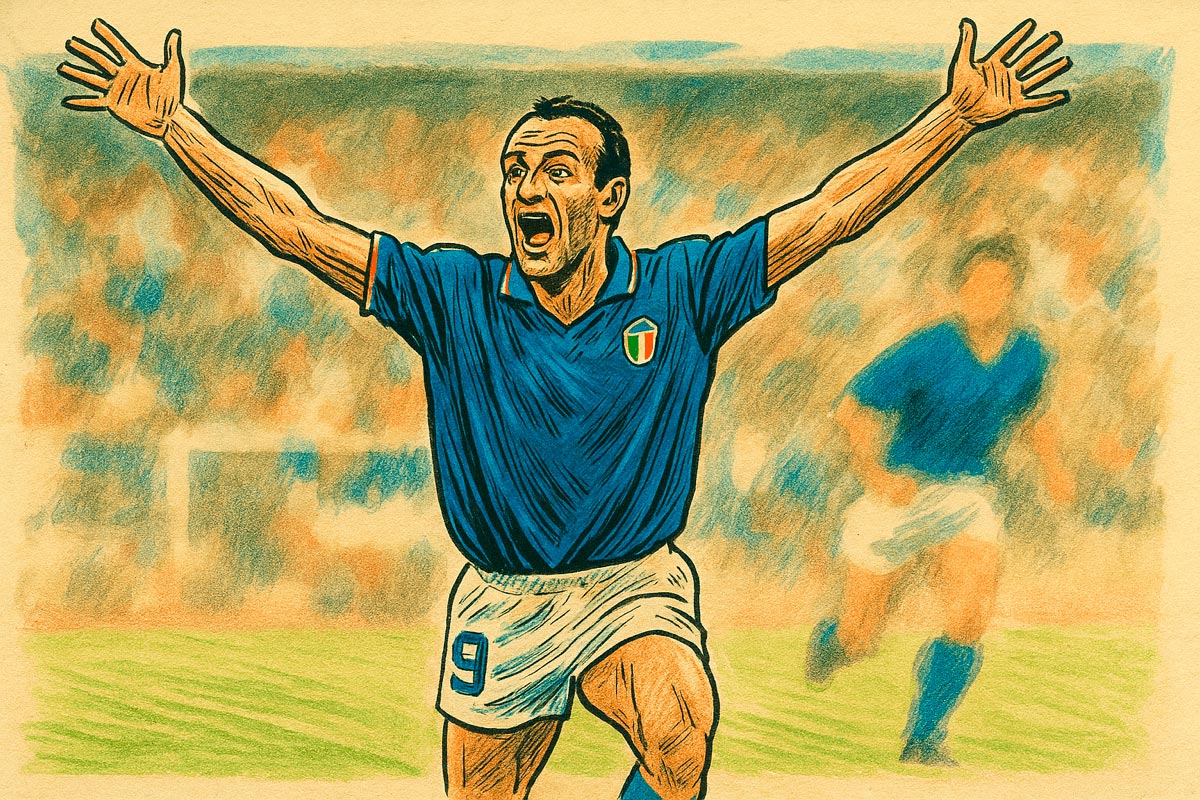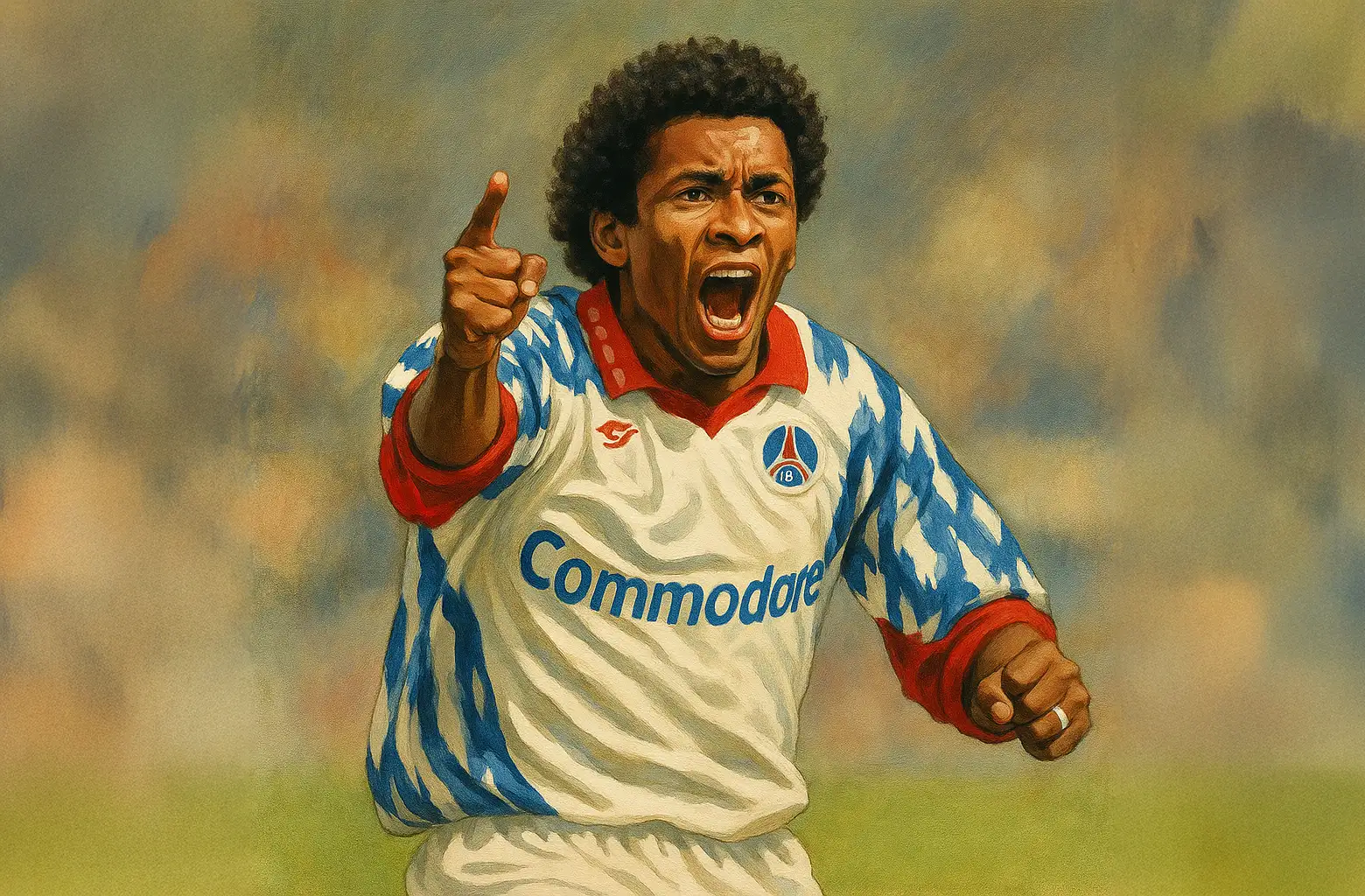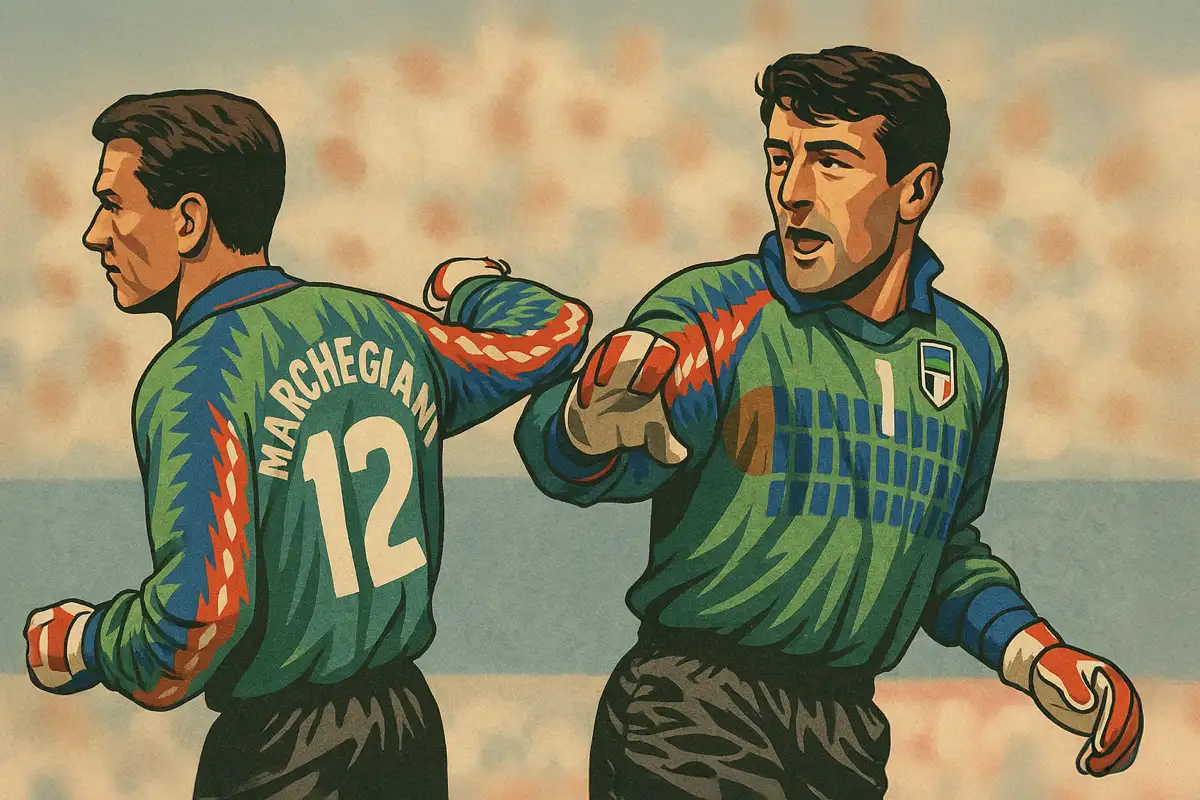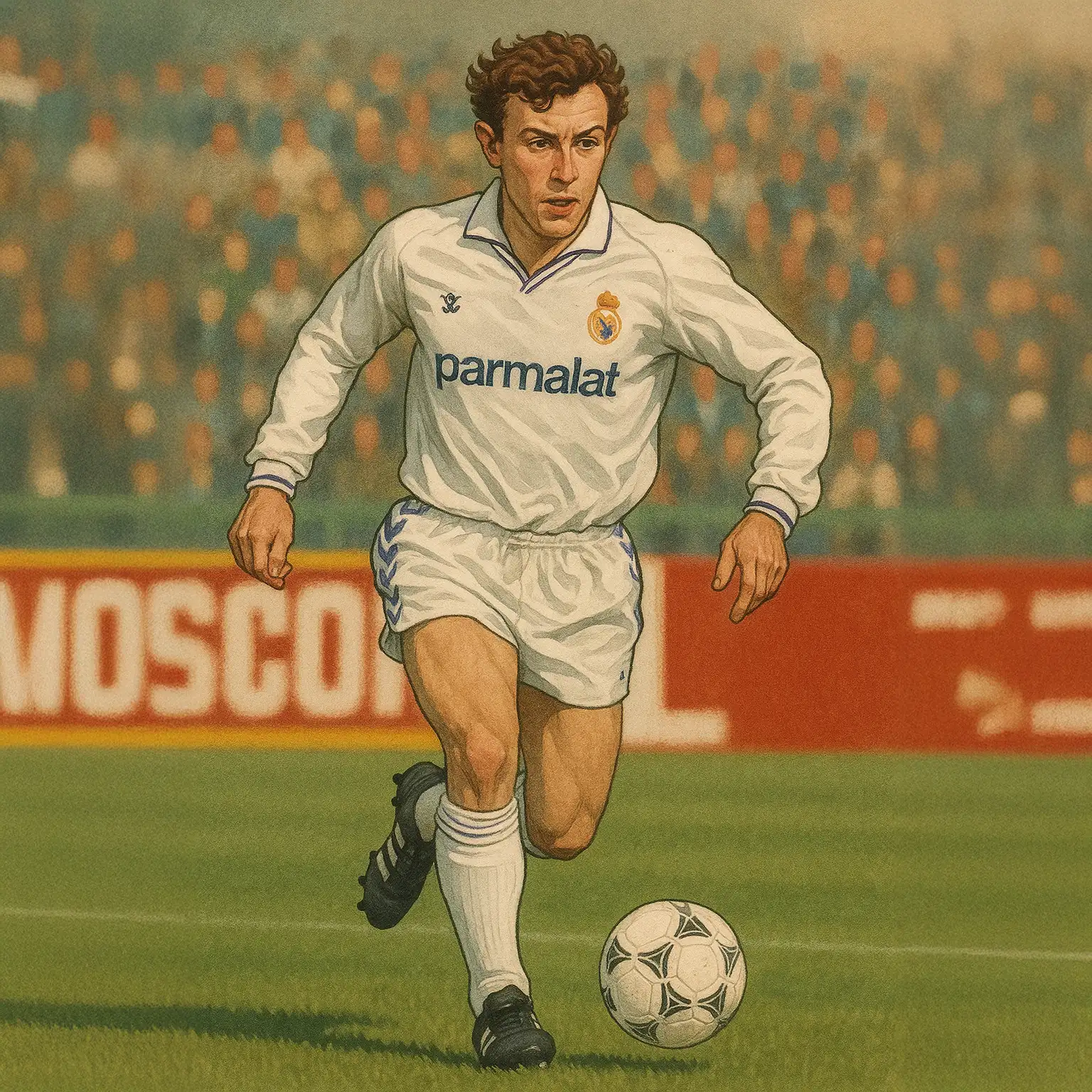
When we speak of footballing legends, we often refer to brilliant careers built over years, perhaps decades. Players whose names echo through time, etched in seasons of dominance, club glories, and international triumphs. But occasionally, football gifts us a story so unlikely, so concentrated in brilliance, that it takes on a mythic glow.
Salvatore Schillaci — Totò, as he was lovingly called — is one of those stories. For one unforgettable summer in 1990, he wasn’t just a footballer. He was the footballer. And then, almost as quickly as he arrived, he was gone. Gone, but never forgotten.
The Sicilian Spark
Born from a poor family in Palermo in 1964, Totò Schillaci didn’t follow the traditional path to greatness. He didn’t rise through the ranks of a Serie A academy. Instead, his boots were first laced in the rough and tumble lower tiers of Italian football, with Messina, in Serie C2. The year was 1982. There, on pitches more gravel than grass, he honed his instincts — not with flair, but with fire. Across seven seasons, Schillaci was a regular figure on Messina’s rise up to Serie B, capping this rise with a superb 1988-89 season, where he finished as Serie B’s top scorer with 23 goals.
He was small, wiry, and played with a nervous intensity, always chasing the next chance, the next opposition mistake, the next goal.
That form eventually brought Juventus to his door. In the summer of 1989, they signed him for around €3 million. A considerable investment at the time, especially for a 24-year old player with no top-flight experience.
Juventus weren’t just looking to replace anyone; they were rebuilding, after a disappointing fourth place in the previous season. They parted ways with seasoned striker Alessandro Altobelli and danish playmaker Michael Laudrup, who left for Barcelona. And, alongside Schillaci, they also signed 21-year old striker Pierluigi Casiraghi. Fueled by the creative power of soviet midfielder Sergei Aleinikov and the talented Rui Barros, Totò had a tremendous season with 21 goals overall, 15 of them in the Serie A – finishing behind names like Baggio, Maradona and van Basten. And Juventus got back to its winning ways, conquering the Copa Italia in a final against the all-powerful (and European Champions this same season) Milan, and the UEFA Cup against Fiorentina. This was the hayday of Serie A.
The Forgotten Forward
Having one’s best season before a world cup being played in your home country is timing perfection. And perhaps this was the fuel behind Totò’s exhibitions. However, as Italy prepared for their home World Cup in 1990, the spotlight was elsewhere. On Baggio, of course. On Gianluca Vialli, the Sampdoria star who had terrorised Serie A defences. Or on his attacking partner, the skilful and cerebral Roberto Mancini. On Carnevale, a muscular, industrious striker from Napoli (who had just won Napoli’s first Serie A title alongside Maradona and Careca). And on Aldo Serena, the elegant Inter forward. Schillaci?
Schillaci was now part of an elite group of strikers that was called up by Azeglio Vicini. But he was an afterthought, a late inclusion. He had only made his Italy debut three months prior. With one cap on his resumé, his chances of getting any minutes in the World Cup were slim.
Grabbing the Opportunity
June 9, 1990 at Rome’s Olympic Stadium. Vicini’s team, like most Italian teams, was a defensive powerhouse. With Zenga in goal, the defensive line was made of Bergomi, Baresi, Ferri and Maldini. In midfield, Donadoni, Ancelotti, de Napoli and Giannini. Upfront, no Totò, Italy started with Vialli and Carnevale. And yet, as Italy took the field for their opening game against Austria, destiny stirred.
Late in the second half and with the match stuck at 0-0, Vicini looked to the bench. On came Schillaci in the 75th minute. Three minutes later, Donadoni found Vialli in the right edge of the box, who crossed the ball perfectly and Totò, with his first touch, scored. A perfect header from the 175cm striker in the middle of the Austrian giants. Cue the explosion — in the stadium, in the country, in his life.
Fireworks in the Night
From that moment, the World Cup belonged to him.
He didn’t start the second game, on June 14th against the United States. Carnevale again got the nod. Schillaci only came in for him in the 51st minute, with the game already at 1-0 (Giannini scored the goal). Another slim win, the team was not convincing. The murmurs had begun. Schillaci was in form. He was fearless.
5 days later, on June 19th, with Italy already qualified, he finally got a place in the starting lineup for the third game against Czechoslovakia. Alongside Baggio, Italy finally found its rhythm. Schillaci scored the opener; Baggio added the second, a moment of magic that would become iconic. But even that goal, the goal of the tournament, didn’t fully eclipse Schillaci’s rising star. Both attackers played the full 90 minutes and Italy’s attacking partnership was formed.
Italy was through to the round of 16. 3 games, 3 wins, 4 goals scored and zero conceded (Zenga would go on to set a record of 517 minutes without conceding at a World Cup).
“
The hunger of Salvatore Schillaci and the genious of Roberto Baggio: Italy’s 1990 attacking partnership was formed.
The Knockout Round
The next opponent was Enzo Francescoli’s Uruguay. It was June 25th, again at Rome’s Stadio Olimpico. It was again Schillaci who opened the scoring in the 65th minute. He played for the full 90 minutes and was everywhere — poaching in the box, pressing defenders, wearing his heart on his sleeve. Italy were starting to believe.
Then came Jack Charlton’s Ireland in the quarter-finals. A tough, stubborn opponent that was also doing an impressive tournament. Italy needed a moment. It came from Schillaci. A powerful Donadoni shot was parried by Pat Bonner but fell to his feet. In one fluid motion, he struck. 1-0. Another winner.
Fast-forward to July 3rd 1990. The semi-final against Argentina in Naples was destiny laced with drama. It was the first game away from Rome. With the crowd torned between rooting for their team’s star (Maradona had just given Napoli their first ever scudetto) or for their home team, it was a packed Paolo stadium that saw one of the most emotional games of the tournament.
Italy scored first on the 17th minute — Schillaci again, reacting quickest after a rebound. But Argentina equalised in the second half through a Claudio Caniggia goal (another Serie A star, as he played for Atalanta). The match went to penalties.
Note: Argentina had already overcame Yugoslavia in the previous round on penaltis, thanks to the heroics of Sergio Goycochea. This was not a game for the faint harted.
Baresi drilled his penalty in. Serrizuela scored a horrible penalty, right at the center, that Zenga was unable to keep out. Then came Baggio, who scored his penalty although Goycochea got a hand to it. Burruchaga equalised again. De Agostini, with a classy penalty, made it 3-2 to Italy. So did Olarticoechea. Up came star midfielder Donadoni, who was having a great tournament. He tried to place the ball, but Goycochea guessed correctly and saved the penalty. Then came Maradona, who misstepped Zenga to score with ease. Serena had to score, but he went for power and couldn’t beat Goycochea, who was again Argentina’s hero.
Schillaci had done all he could, but it wasn’t enough. Italy were out.
In the third-place playoff, at Bari’s San Nicola’s stadium, Italy faced another disappointed nation: England, also beaten on penalties, against Germany. Schillaci and Baggio started upfront again and Totò assisted Baggio’s opener and scored the winner — an 86th minute penalty — sealing his tally at six goals in seven matches.
He won the Golden Boot. He won the Golden Ball. He was a substitute turned symbol. The wild-eyed Sicilian with a cannon in his boot.
His name was forever associated with the world’s biggest competition: the World Cup.
The Vanishing Star
After the World Cup, Schillaci returned to Juventus a national hero. But that moment, that fire, was impossible to maintain. Defences were tighter, expectations heavier. The goals didn’t flow. He was still a starter: he played alongside Roberto Baggio (who was bought from Fiorentina for €12.9m) and scored 5 goals in 29 league games in 1990-91 season. But Juventus came in 7th place in a Serie A won by Sampdoria and the wonder duo of Vialli & Mancini. The following season Juventus came in 2nd place (behind undefeated champions AC Milan) and although Schillaci still scored 6 goals in 31 league appearances, he was starting to lose his place to up-and-coming Pierluigi Casiraghi.
So it was without much surprise that he was sold to Inter for €4.4m, aged 28. Back in Turin, Juventus began creating the team that would challenge the supremacy of AC Milan and win the Champions League, by signing 28-year old Gianluca Vialli for a world-record transfer fee of €20.60m from Sampdoria, and rising star 24-year old Fabrizio Ravanelli for a mere €1.5m from Reggiana.
At Inter, Schillaci struggled to make an impact. Although the team came in second place in the 1992-93 season, it was uruguaian Ruben Sosa that was the team’s goalscorer. Both Totò and fellow striker Darko Pancev both failed to reach the level of the south american. In 2 years at Inter, the fit never quite clicked. Injuries took their toll. The urgency, the raw edge that had defined him, began to fade. The following season, 1993-94, Inter bought young dutch attacker Dennis Bergkamp and Totò’s playing time reduced significantly. It was time to move on.
Big in Japan
Back in Palermo, Schillaci kept his roots close. He opened a football academy. He stayed out of the limelight. He didn’t chase punditry or politics. He knew his story. He knew it was enough.
In September 2024, Salvatore Schillaci passed away aged 59, after a battle with colon cancer. His death triggered a wave of emotion across Italy. For those who remembered that summer, it was personal. Schillaci wasn’t just a player. He was their player. A working-class hero. A bolt from the blue.
“
Schillaci was a reminder that one summer is sometimes all it takes to become immortal.
Life After the Roar
Back in Palermo, Schillaci kept his roots close. He opened a football academy. He stayed out of the limelight. He didn’t chase punditry or politics. He knew his story. He knew it was enough.
In September 2024, Salvatore Schillaci passed away aged 59, after a battle with colon cancer. His death triggered a wave of emotion across Italy. For those who remembered that summer, it was personal. Schillaci wasn’t just a player. He was their player. A working-class hero. A bolt from the blue.
More Than a Moment
So why didn’t it last?
Some careers burn steady. Others burn fast. Schillaci was the latter. His style was high-octane, emotionally charged, physically intense. It was never built for twenty years. It was built for impact. And what impact it had.
In an age of metrics and management, Schillaci was a reminder that football is still magic. That a man from Palermo could set the world alight with raw desire and sheer belief. That one month is sometimes all it takes to become immortal.
Totò Schillaci lived that dream. And for one golden summer, he made it ours too.
Legacy
Salvatore “Totò” Schillaci ended up with a mere 16 games and 7 goals for the italian national team.
This means he scored all but one of his goals at the World Cup. But when you think about Italian strikers, he stands out from other big names that have much more caps than he does.
While others played for a decade with the Azzurri, and were constant stars, Totò was a shooting star, he was more than a player, he was the symbol of an entire tournament and, for many of us, an inevitable name that reminds us of our lost youth. For all this, his name will forever be remembered. He burned fast but so, so high.
Ciao, Totò.

Valdo – provisory title
He dribbled like a dancer, played with a smile, and made chaos look beautiful. A rebel with the ball, and a genius no system could ever hold down.

Italy’s 90’s Goalkeepers – provisory title
He dribbled like a dancer, played with a smile, and made chaos look beautiful. A rebel with the ball, and a genius no system could ever hold down.

Emilio Butragueño – provisory title
He dribbled like a dancer, played with a smile, and made chaos look beautiful. A rebel with the ball, and a genius no system could ever hold down.

